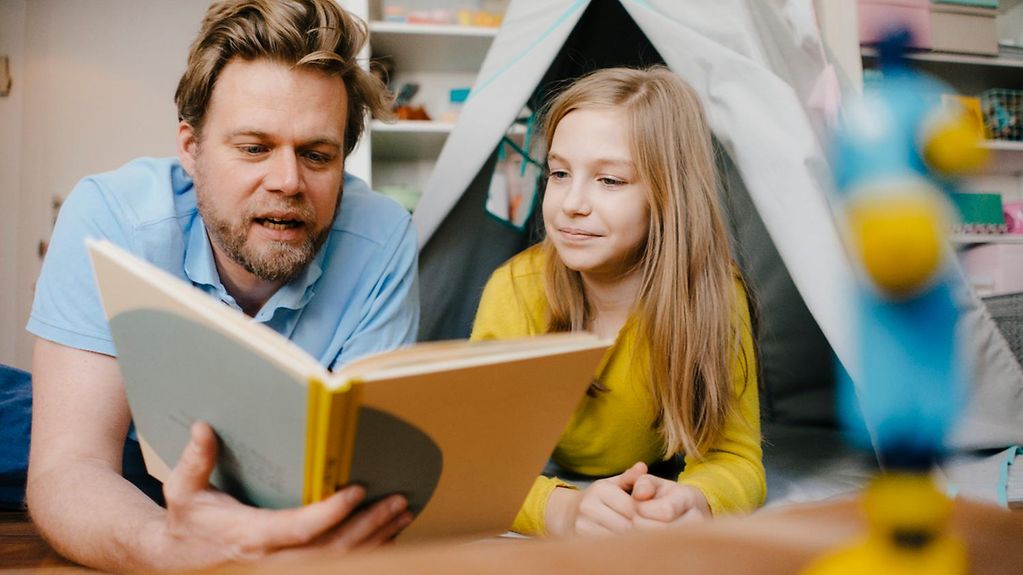COVID-19 pandemic
Parents currently face enormous challenges: nurseries and schools are closed, there are limits to how much parents can look after their children parallel to working from home – and short-time work and job losses threaten to plunge families into financial disaster. The German government has introduced far-reaching measures to support families during the pandemic.
4 min reading time

Parents who have to look after their children themselves because the authorities have ordered schools and nurseries to close are to be compensated for a large percentage of their lost earnings.
Photo: mauritius images / Westend61
- Child sick pay: Child sick pay is intended to offset loss of earnings suffered when parents have to take time off work to look after their sick children. In view of the special challenges posed by the COVID-19 pandemic, parents’ entitlement to child sick pay is to be extended for 2021. The entitlement will be raised from 10 to 20 days per child for each parent, and for single parents from 20 to 40 days per child. It is important to note that the entitlement applies not only to times when the child is sick, which is normally the case, but also to periods when nurseries and schools are closed because of the pandemic, or have only limited opening, meaning that parents must look after their children at home. Parents with statutory health insurance are entitled to up to 90 per cent of the net income they have lost. Statutory health insurance schemes may require evidence that compulsory attendance has been suspended for nurseries and schools for this period.
- Continued pay: Parents who have to look after their children themselves because the authorities have ordered schools and nurseries to close are to be compensated for a large percentage of their lost earnings. They are entitled to compensation equivalent to 67 per cent of the loss of earnings. This entitlement applies for a maximum of 20 weeks, 10 weeks for each parent and the full 20 weeks for single parents. The maximum period of 10 or 20 weeks does not need to be taken at once. It can be spread over a period of several months. People with custody of children up to the age of 12 are entitled to continued pay, as are people with custody of children with a disability and in need of special assistance. The precondition is that during the period the nursery or school is closed, no other reasonable childcare options are available for the child. The regulation is in place for a limited period until 31 March 2021.
- Supplementary child benefit: The supplementary child benefit supports single parents and low income families. Every month, families can be granted a supplementary payment of up to 205 euros per child. Whether or not families are entitled, and the amount to which they are entitled, depends on many different factors, including their income and the age of the children. To simplify applications, the review of assets has been facilitated for an interim period. Parents are no longer required to give details about their assets if they have no significant assets. This regulation is in force until 31 March 2021.
- Tax-free allowance for single parents: The tax-free allowance for single parents has been increased significantly for 2020 and 2021. It reduces taxable income, i.e. single parents pay tax on a smaller part of their income. It has been more than doubled from 1,908 euros to 4,008 euros, to take account of the increased workload of looking after children for single parents in particular during the pandemic.
- Parental allowance regulations: To support young families and expectant parents, the special regulations for parental allowance have been extended until 31 December 2021. Under these regulations income substitution benefits such as short-time work allowance and unemployment benefit I will not result in any reduction of parental allowance. This will affect parents who have hitherto worked part-time and receive parental allowance. Months in which the income was lower can be discounted for the purposes of calculating parental allowance. This affects couples expecting a child, who have suffered a pandemic-related loss of income, for instance because they have received short-time work allowance.
- Studying and training: Trainees and students who received BAföG financial assistance before the pandemic will continue to receive this support, even if their place of training is closed due to COVID-19 or their lectures are not taking place at university. The assistance is also to be made significantly more accessible. Many students who have otherwise earned money alongside their course or who have received support from their parents, and whose income has been lost due to COVID-19 will find it worthwhile applying for BAföG financial assistance. If they are not entitled to BAföG assistance, students can apply for transitional support, which consists of a non-repayable grant and an interest-free student loan.
Families hold our society together. They are the focus of the policies of the German government. Here you will find an overview of the relevant measures undertaken in the ongoing legislative period.